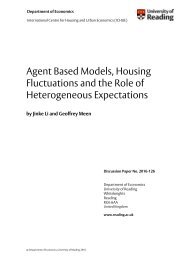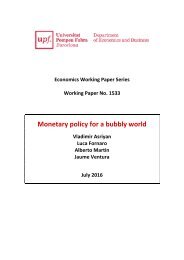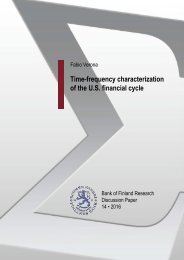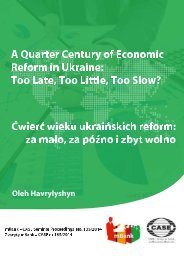Necessity as the mother of invention monetary policy after the crisis
n?u=RePEc:dnb:dnbwpp:525&r=mac
n?u=RePEc:dnb:dnbwpp:525&r=mac
You also want an ePaper? Increase the reach of your titles
YUMPU automatically turns print PDFs into web optimized ePapers that Google loves.
situation contr<strong>as</strong>ts sharply with that <strong>of</strong> <strong>the</strong> Fed, where <strong>the</strong> U.S. Congress can change <strong>the</strong><br />
central bank’s governing statutes any day it chooses.<br />
Traditionally, <strong>the</strong> issue <strong>of</strong> whe<strong>the</strong>r <strong>the</strong> central bank is or is not part <strong>of</strong> <strong>the</strong> government<br />
h<strong>as</strong> been elided by appealing to <strong>the</strong> doctrine <strong>of</strong> central bank independence in <strong>monetary</strong><br />
<strong>policy</strong>. At le<strong>as</strong>t in principle, a sharp line separates <strong>monetary</strong> <strong>policy</strong> from a long list <strong>of</strong><br />
functions collectively called fiscal <strong>policy</strong>. 31 According to an unwritten (in most countries)<br />
truce, <strong>the</strong> central bank is granted control over <strong>monetary</strong> <strong>policy</strong> while <strong>the</strong> elected<br />
government retains full control over fiscal <strong>policy</strong>. Importantly, each player tacitly or<br />
explicitly agrees not to poach into <strong>the</strong> o<strong>the</strong>r’s territory.<br />
There are good re<strong>as</strong>ons for this division <strong>of</strong> labor. For example, Alesina and Tabellini<br />
(2008) argue that delegation <strong>of</strong> decision-making authority to non-elected bureaucrats with<br />
career concerns (<strong>as</strong> opposed to politicians) is especially beneficial when <strong>the</strong> t<strong>as</strong>ks are<br />
technical in nature and monitoring quality is difficult. That sounds like <strong>monetary</strong> <strong>policy</strong>.<br />
Ano<strong>the</strong>r important consideration is <strong>the</strong> extent to which <strong>the</strong> <strong>policy</strong> is redistributive, and<br />
thus relies on value judgments and political legitimacy more than on technical expertise. 32<br />
5.2. The <strong>crisis</strong> and “<strong>the</strong> line”<br />
The “line” between fiscal and <strong>monetary</strong> <strong>policy</strong> seemed at le<strong>as</strong>t modestly clear until <strong>the</strong><br />
financial <strong>crisis</strong>. Then central banks around <strong>the</strong> world were ei<strong>the</strong>r called upon, or felt<br />
compelled, to take many actions <strong>the</strong>y had never (or rarely) taken before. Think, for<br />
example, about lending to banks on a m<strong>as</strong>sive scale (not entirely unprecedented, but very<br />
rare) against collateral that didn’t quite meet Bagehot standards—an action which can<br />
e<strong>as</strong>ily slide into a “bailout” <strong>of</strong> an imperiled bank. Or lending to nonbank financial<br />
institutions. Or purch<strong>as</strong>ing non-traditional <strong>as</strong>sets such <strong>as</strong> mortgage-backed securities (<strong>the</strong><br />
Fed), peripheral country debt (<strong>the</strong> ECB), and a wide variety <strong>of</strong> financial instruments (<strong>the</strong><br />
Bank <strong>of</strong> Japan)—just <strong>the</strong> sorts <strong>of</strong> “unconventional” <strong>monetary</strong> <strong>policy</strong> instruments we<br />
discussed in Section 3.<br />
Each <strong>of</strong> <strong>the</strong>se unusual activities shares one attribute in common: There is a non-trivial<br />
chance that <strong>the</strong> central bank, and thus indirectly <strong>the</strong> country’s taxpayers, will suffer a<br />
loss. 33 For this re<strong>as</strong>on, <strong>the</strong>y are <strong>of</strong>ten called qu<strong>as</strong>i-fiscal policies, a term that suggests that<br />
such actions constitute a kind <strong>of</strong> government spending, which <strong>the</strong>y do in an actuarial sense.<br />
Public spending by <strong>the</strong> central bank crosses <strong>the</strong> traditional line between <strong>monetary</strong> and<br />
fiscal <strong>policy</strong>, suggesting to some that <strong>the</strong> central bank h<strong>as</strong> strayed into <strong>the</strong> fiscal domain.<br />
A number <strong>of</strong> writers view this <strong>as</strong> ei<strong>the</strong>r an inappropriate or a dangerous position for <strong>the</strong><br />
central bank to be in. 34<br />
During <strong>the</strong> <strong>crisis</strong> in <strong>the</strong> U.S., politicians and <strong>the</strong> public were surprised to learn how much<br />
power <strong>the</strong> Fed actually had. In a famous incident regarding <strong>the</strong> rescue <strong>of</strong> insurance giant<br />
31<br />
That list extends well beyond macroeconomic stabilization <strong>policy</strong>.<br />
32<br />
See Blinder (1997). This view should perhaps be tempered by recognizing that <strong>monetary</strong> policies have more redistributive<br />
consequences than are normally acknowledged.<br />
33<br />
As an example <strong>of</strong> an extreme version <strong>of</strong> suffering losses, Hall and Reis (2015) discuss <strong>the</strong> implications <strong>of</strong> possible (technical)<br />
insolvency <strong>of</strong> <strong>the</strong> central bank.<br />
34<br />
See, for example, Buiter (2014).<br />
33








